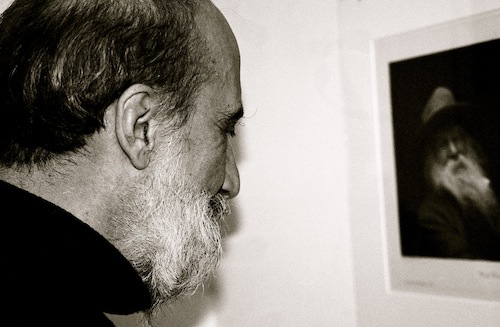Zurita and the Snowman

Late last night, on the phone, a dear friend told me “a poem is something produced through the poet.” Each of us hung up, in our distant cities, with this idea in mind. She said she called to broaden my horizons, to calm my doubts. I took it in another direction. A poet is someone who makes poems, like a carpenter makes tables and chairs. Before falling asleep I remembered a recent dream: I was walking on snowy ground when I bumped into a dear friend who was treading carefully across the snow. Moving forward we found a large snowman next to a busy avenue. My friend gave the snowman feet, measuring the snowman’s height to his own. Later in the dream, the cold was so intense he too was frozen.
I woke up to the deafening sound of horns on a sweltering day. The celebration of San Miguel’s “The Day of the Crazies” and its infernal music melted the material on which the dreams of the night were made. I wasn’t going out this year to see the parade but knew anyway that thousands of people disguised as devils, animals, and saints were moving through the street in the heat of the day. Even when you aren’t there, as in this case, what happens in the street has an effect indoors. I yelled the opposite of our phone call’s idea: “a poem is something that upon being written makes a poet.” I thought of the snow from the dream, of my frozen friend beside the snowman. In “reality,” he himself had lived in that city for several months, and there, had written some poems that he sent me (I was in New York at the time), little by little. While he was there (in Boston) he taught classes and as soon as he could, he would return home to continue with his book. The heat quit working a couple of times, and like a good Latin American he didn’t know how to ask for it to be fixed so he continued writing submerged beneath heavy blankets. He told me that he wore the hat that helped him tolerate the cold on a trip to Russia. So, he sent me pages of what would become Zurita. He had curious problems if he was to continue writing this book. One of them was that each section should have nine poems, but he wrote to me that when he was on the seventh, the feeling that the next two wouldn’t come to him filled him with despair. Another problem was that the section needed to begin at dawn and end at dusk, and yet another was that the order of events in the poems didn’t help the flow of time. The morning needs to arrive and be white, he wrote me at three in the morning, and the true dawn eventually came, outside of his window, but that morning didn’t occur in the poem like he thought it should have. Zurita himself was responsible for a world made of materials as fragile as the snow, and only to the extent that the dawn was as white as “necessary” was he able to return to being a poet. Being a poet, therefore, wasn’t a permanent state. It was the poem that made the poet. The book called Zurita reached 713 pages, offering few clues as to how many times its point of not existing also made the poet not exist. Raúl Zurita ends (and begins) the book with a question, a question the ghost of his own father (who died when Zurita was two) doesn’t answer:
Can you imagine the surf breaking on these rocks again?
Father never tells me anything.
At the end of the book Zurita’s father was as silent as the snowman, as silent as the snow that swallows the sounds that exist and those that shouldn’t. We could now say that that poet exists. His masterpieces behind him (Purgatory, Song For His Disappeared Love, Anteparadise and the amazing Zurita) prove this, but if you ask him, Zurita himself cares only about the page in white before him, it’s her that could or could not give him life. And at times the page shows up. And other times, she doesn’t. And I see with melancholy all those letters that repeat “it always starts from zero” and the letters that quote that line of Baudelaire’s: “God grant me the grace to write a couple of beautiful poems to help me feel that I’m not the worst of men, not even inferior to those I scorn.” On one of these occasions when he sent me this line, the letter came accompanied by the poem that had allowed him, that day, to be a poet. I re-read it here and remember the impression left in me from his mother’s swimsuit that transformed into an injured bird:

Now as I say this, there’s something ironic about Zurita becoming a frozen man next to the snowman, as if my dear friend, the man, was the imitation. It is the knowledge of this, the fragility of the condition of standing in awe in front of the blank page that presently appears, today, this one time only, not knowing if it is the last, that makes us feel as if we are melted upon the material of our dreams, still unable to be part of the parade that even now continues on in the street.
Translated by Torin Jensen
Poem translated by E.M. Test
Painter and poet Valerie Mejer was born in Mexico City. Her poems explore containment and fragility,...
Read Full Biography

